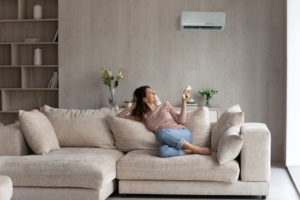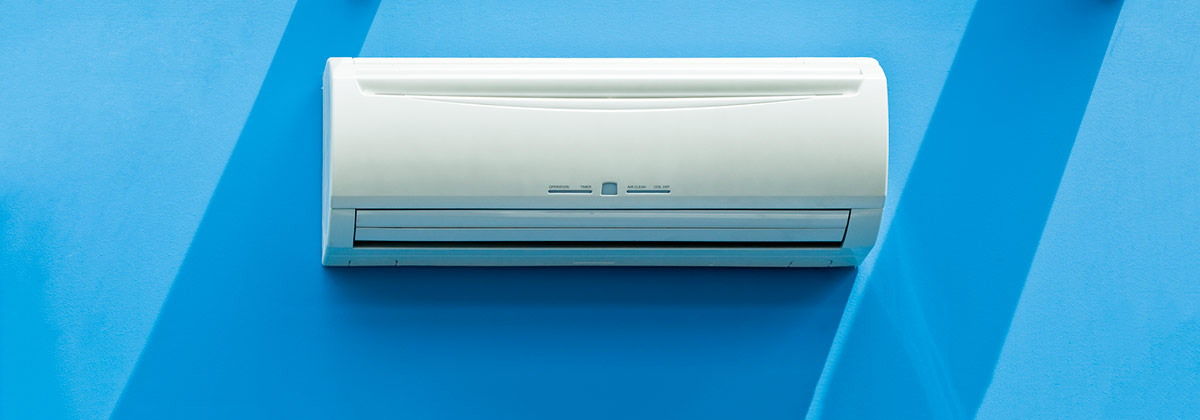Australian summers can be brutal, so you want the right air conditioner to suit your home’s size and needs. Choosing the right air-con seems simple but there are some more specific details that should be taken into consideration before diving head first into a purchase. Read on to find out more about air conditioning sizes in this Canstar Blue guide.
What’s in this article?
Types of air conditioners
There are plenty of air conditioners to choose from, so picking the right one for your needs can be beneficial. The four main types of air conditioners are split system, ducted, portable and window air conditioning units.
Split system air conditioner
Split system air conditioning units are designed to cool and heat homes and are built into the wall to cool that particular room. While they are efficient at cooling one room, they can bring the temperature down in surrounding rooms if left running for quite some time.
Ducted air conditioner
Ducted air conditioning is built into the entire home with a control panel to set which rooms you would like to heat or cool. There is a central unit that runs through the home making it ideal for larger homes with multiple rooms.
Portable air conditioner
Portable air conditioners come in an array of sizes and can be used to cool smaller rooms. Some models are designed to be small for desktop use and others can be larger units that sit on the floor to cool slightly larger rooms.
Window air conditioner
Window air conditioners sit on a window sill and draw air from outside to cool a room. These types of air conditioning units can be ideal for small to medium-sized rooms but may not be as efficient as other models.
Factors to consider for air conditioner size

When it comes to sizing up an air conditioning unit for a room, there are a number of factors to take into consideration including room size, orientation and insulation.
Room size
Each individual room in your home will have different air conditioning capacity requirements. Generally speaking, you’ll need about 0.12 to 0.15 kilowatts of power per square meter of floor area. This is calculated by multiplying a room’s length in meters by its width in meters. You’ll also need to take into account ceiling heights in your calculations as rooms with higher ceilings will always need more energy to cool.
Orientation
The orientation of your home, as well as the size and orientation of windows and glass doors in each room, will impact your choice when it comes to settling on the right AC unit size. Do you know which rooms the midday sun hits? As a general rule, southern-facing rooms will be cooler which means they won’t require as much cooling capacity as north-facing rooms that receive sun for the longest period of the day. The ideal orientation for your home will also depend on your climate zone.
Insulation
Insulation is a material located within your home’s walls and ceilings designed to slow or prevent heat flow. In other words, insulation makes your home thermally efficient − it helps to keep heat inside your home in winter and outside your home in summer. The performance of any insulation product (how well it resists heat flow) is known as its R-value. The higher the R-value, the higher the level of insulation.
You’ll need to consider your home’s level of insulation when deciding on which air con size you need because if your house is poorly insulated (has a low R-value), your air conditioner will need to work much harder to keep the place cool or warm. Reflective insulation and bulk insulation are the most common forms of insulation used in Australia today.
How to calculate air con size?
There are calculators online that allow you to figure out the cooling or heating capacity you need for your home. Depending on which calculator you use, the capacity takes into account a variety of factors such as:
- Type of air conditioner
- Whether the roof is insulated
- Window and window glass type
- Room height
- Room width
- Room length
- The amount of sunlight the room is usually exposed to
- Whether the room directly faces the afternoon sun
- Climate
Some aircon installers also provide online calculators on their websites and offer a few common size options if you’re unsure of measurements or just want a quick guesstimate before diving into specifics.
| Room size | Room examples | Air con kilowatt capacity |
|---|---|---|
| 10-25m2 | A small kitchen, bedroom, study, small lounge, small office | 2.5kW |
| 25-35m2 | Bedroom, small lounge, small room with a high ceiling, office, mid-sized kitchen | 3.5kW |
| 35-60m2 | A large bedroom, bedroom with an ensuite, mid-sized lounge | 5-6kW |
| 60-80m2 | Large lounge, large open plan area, small shop, office | 7-8kW |
General Guide Only
How much will an air conditioner cost?
Air con units will vary in price depending on the type of air-con and the size. You can expect to pay from $600 to upwards of $5,000 with portable air conditioners coming in the cheaper end and ducted air con units costing far more due to their size and need for installation by a professional.
How much will an air conditioner cost to run?
How much your air-con will cost to run will come down to a number of factors such as the size of the unit, how long and how often you run it and the specific type of air-con. It will also depend on your electricity provider and the rates that they estimate and offer. Find out more about air conditioner running costs from this Canstar Blue guide.
Which type of air conditioner should I buy?
Which type of air conditioner you buy will come down to a number of factors. First will be the size of your home and the rooms within it. If you have a larger home ducted air-con could be ideal, whereas if you live in a smaller apartment a split system unit could suit better. It will also come down to personal preference for how much you want to spend on your energy bill. If you’re still not sure which type of air conditioner is right for you, compare brands below.
Original Author: Tahnee-Jae Lopez-VitoSp




Share this article